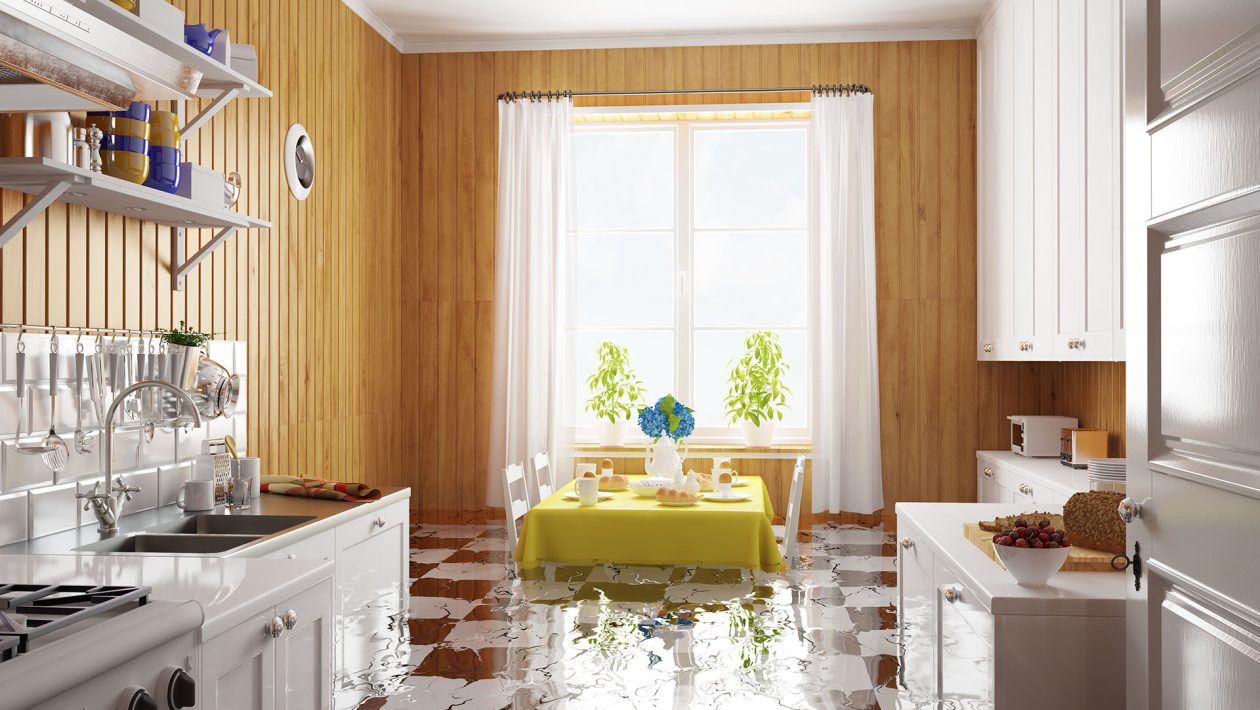Table of Contents
Key Takeaways:
- Water damage can lead to devastating effects on a home’s structure and possessions and serious health risks if not properly addressed.
- Common sources of water damage in homes include leaking pipes, burst or frozen pipes, appliance malfunctions, roof leaks, foundation cracks, clogged drains, and sewage backups.
- Severe weather events, such as heavy rainfall and storms, can cause roof leaks, flooded basements, and increased humidity levels that promote mold growth.
- Plumbing issues like leaking or burst pipes, faulty water heaters, and backed-up sewer lines can result in significant damage if not promptly addressed.
- Water damage poses health risks due to the breeding of mold and bacteria, which can cause allergic reactions, respiratory issues, and infections.
- Water can weaken a home’s structure by rotting, warping, and deteriorating building materials.
- Water damage can create electrical hazards and increase fire risk due to contact with electrical wiring and appliances.
- After discovering water damage, the key steps to take include assessing the extent of the damage, mitigating further damage, and starting the restoration process by repairing and replacing damaged materials.
- Hiring a professional water damage restoration Montgomery AL company is recommended for their expertise, equipment, and ability to prevent further damage and health risks.
- Factors to consider when selecting a restoration company include their experience, licensing, availability of emergency services, positive customer reviews, and insurance coverage.
- During the restoration process, professionals work to restore the home to its pre-damage condition by drying out affected areas, removing damaged materials, and implementing necessary repairs.
- Water damage restoration requires immediate action to mitigate risks and minimize downtime, as it can lead to serious health risks, structural damage, and electrical hazards.
Water damage can be a homeowner’s worst nightmare. The effects can be devastating, whether caused by a burst pipe, heavy rainfall, or a sewage backup. Not only does water damage ruin your possessions and damage the structure of your home, but it can also lead to serious health risks if not properly addressed. In Montgomery, AL, where severe weather is not uncommon, water damage restoration is an essential service for homeowners.
Understanding the Causes of Water Damage
Before we dive into the steps of water damage restoration, it’s important to understand the common causes of water damage. By identifying the source of the problem, you can take preventive measures to avoid future damage.
1. Common Sources of Water Damage
Water damage can originate from various sources in your home. Common culprits include leaking pipes, burst or frozen pipes, appliance malfunctions, roof leaks, foundation cracks, clogged drains, and sewage backups. These sources of water damage can lead to significant issues if not addressed promptly. Understanding these potential sources can help you identify problems early on and prevent further damage.
2. The Impact of Weather on Water Damage
Weather conditions play a significant role in the occurrence and severity of water damage. Homeowners must be vigilant in Montgomery, AL, where heavy rainfall and storms are common.
Severe weather events can lead to roof leaks, flooded basements, and other water damage. Additionally, high humidity levels can create the perfect environment for mold growth, which can further exacerbate the damage and pose health risks.
By understanding how weather can contribute to water damage, homeowners can take steps to protect their homes and mitigate the risks.
3. How Plumbing Issues Contribute to Water Damage
Plumbing problems are another common cause of water damage. Issues such as leaking or burst pipes, faulty water heaters, and backed-up sewer lines can significantly damage your home.
Even a small leak can lead to mold growth, wood rot, and structural damage if left unaddressed. Regular plumbing system maintenance and inspections can help identify potential problems and prevent water damage.
The Dangers of Water Damage
Water damage goes beyond just a few soaked carpets or damaged furniture. It poses serious risks to your health and your home’s structure. Understanding these dangers is crucial to highlight the importance of immediate restoration.
1. Health Risks Associated with Water Damage
One of the primary concerns related to water damage is the health risks it can pose. When water accumulates in your home, whether from a flood or a plumbing issue, it creates the perfect breeding ground for mold and bacteria.
Mold spores can spread quickly and release toxins that can cause allergic reactions, respiratory issues, and other health problems. Bacterial growth can also occur in stagnant water, increasing the risk of infections and diseases.
Proper water damage restoration is essential to remove excess moisture, dry out affected areas, and prevent mold and bacteria growth.
2. Structural Damage Caused by Water Damage
Water can weaken the structure of your home, causing significant damage if not addressed promptly. When water seeps into the walls, floors, or foundation, it can cause rot, warp, and deteriorate the building materials.
Over time, this damage can compromise the integrity of your home, resulting in costly repairs and potential safety hazards. It’s important to address water damage as soon as it is discovered to prevent further deterioration and maintain the stability of your home.
3. Electrical and Fire Hazards from Water Damage
Water and electricity are a dangerous combination. When water comes into contact with electrical wiring or appliances, it can create a serious fire hazard. This risk is particularly high in cases of flooding or major water leaks.
Water damage can also lead to electrical malfunctions, such as short circuits or electrical systems. These issues pose a fire risk and can lead to power outages and further damage to your home.
Professional water damage restoration ensures that electrical hazards are addressed, potentially saving you from a devastating fire.
Steps to Take After Water Damage
When faced with water damage, knowing what steps to take to minimize the damage and restore your home is important. Here are the key steps to follow after discovering water damage:
1. Assessing the Extent of the Damage
The first step is to assess the extent of the water damage. This involves identifying the affected areas, documenting the damage, and determining the source of the water. By understanding the scope of the damage, you can create a restoration plan and communicate effectively with the professionals.
It’s important to note that visible water damage may only be the tip of the iceberg. Water can seep into hidden areas, such as behind walls or under flooring, leading to hidden damage and potential mold growth.
2. Mitigation and Cleanup Process
After assessing the damage, the next step is to mitigate further damage and begin the cleanup process. This involves removing standing water, drying out affected areas, and disinfecting surfaces to prevent mold and bacterial growth.
Professional water damage restoration companies have specialized equipment and expertise to efficiently remove water, dry the space, and implement proper sanitation measures. They can also help salvage and restore damaged possessions, minimizing the financial impact of the damage.
3. Restoring and Repairing Your Home
The restoration process can begin once the affected areas are thoroughly cleaned and dried. This involves repairing and replacing damaged building materials, such as drywall, flooring, and insulation.
Restoration also includes addressing cosmetic issues, such as repainting walls or refinishing surfaces, to restore your home to its pre-damage condition. The goal is not only to repair the visible damage but also to ensure the structural integrity of your home is restored.
Hiring a Professional Water Damage Restoration Company
While tackling water damage restoration on your own may be tempting, hiring a professional restoration company is highly recommended. Here’s why:
1. The Benefits of Hiring a Water Damage Restoration Expert
Professional water damage restoration experts have the knowledge, experience, and equipment to handle the restoration process effectively. They understand the intricacies of water damage and can quickly assess the extent of the damage.
By hiring professionals, you can ensure that all the necessary steps are followed to prevent further damage, mold growth, and health risks. They also have the tools and equipment to efficiently dry out the affected areas.
2. Tips for Choosing the Right Restoration Company
When selecting a water damage restoration company, consider the following factors:
- Experience and expertise in water damage restoration
- Licensing and certifications
- Availability of 24/7 emergency services
- Positive customer reviews and testimonials
- Insurance coverage
Obtaining quotes from multiple companies and comparing their services can help you make an informed decision. Choosing a reputable company that can meet your specific needs and restore your home effectively is important.
3. What to Expect During the Restoration Process
During restoration, professionals will work diligently to restore your home to its pre-damage condition. This includes drying the affected areas, removing damaged materials, and implementing necessary repairs.
Throughout the process, the restoration company will inform you about the progress and any additional steps required. They will also work with your insurance company to streamline the claims process and ensure you receive the appropriate coverage.
Restoration timelines vary depending on the damage’s extent and the affected area’s size. However, a reputable restoration company will work efficiently to minimize downtime and get you back in your home as soon as possible.
Conclusion
Water damage restoration is not a task to be taken lightly. The importance of immediate action cannot be overstated, as water damage can lead to serious health risks, structural damage, and electrical hazards. By understanding the causes of water damage, the dangers it poses, the steps to take after damage occurs, and the benefits of hiring a professional restoration company, homeowners in Montgomery, AL, can protect their homes and well-being.
FAQ
Question: What are some common sources of water damage in homes? – Common sources of water damage in homes include leaking pipes, burst or frozen pipes, appliance malfunctions, roof leaks, foundation cracks, clogged drains, and sewage backups.
Question: How does weather impact water damage? – Severe weather events, such as heavy rainfall and storms, can cause roof leaks, flooded basements, and increased humidity levels that promote mold growth. Homeowners in areas with heavy rainfall and storms, like Montgomery, AL, must be vigilant.
Question: How do plumbing issues contribute to water damage? – Plumbing issues like leaking or burst pipes, faulty water heaters, and backed-up sewer lines can result in significant water damage. Even a small leak can lead to mold growth, wood rot, and structural damage if left unaddressed. Regular maintenance and inspections of the plumbing system can help prevent water damage.
Question: What are the health risks associated with water damage? – Water damage creates the perfect environment for mold and bacterial growth, which can lead to allergic reactions, respiratory issues, infections, and other health problems. Proper water damage restoration is essential to remove excess moisture and prevent mold and bacteria growth.
Question: How does water damage affect the structure of a home? – Water can weaken the structure of a home by causing the rotting, warping, and deterioration of building materials. Over time, this can compromise the home’s integrity, resulting in costly repairs and potential safety hazards.
Question: What are the electrical and fire hazards associated with water damage? – Water and electricity are a dangerous combination. Water coming into contact with electrical wiring or appliances can create a serious fire hazard. Water damage can also lead to electrical malfunctions, such as short circuits or damaged electrical systems, posing further fire risks and power outages.
Question: What steps should be taken after water damage? – After discovering water damage, the key steps to take include assessing the extent of the damage, mitigating further damage, and starting the restoration process by repairing and replacing damaged materials.
Question: Why is hiring a professional water damage restoration company recommended? – Hiring a professional restoration company is recommended for their expertise, equipment, and ability to prevent further damage and health risks. Professionals have the knowledge and experience to handle the restoration process effectively and efficiently, ensuring all necessary steps are followed.
Useful Resources:
- EPA – Basic Facts About Mold and Dampness
- FEMA – How to Protect Your Home and Property from Flood Damage
- Ready.gov – Water
- National Fire Protection Association – Fire Safety for Older Adults
- OSHA – Emergency Response: Hurricane
- CDC – Mold FAQs
- American Red Cross – Water Damage Information
- International Code Council – Building Codes and Standards








